|
|
|
Sort Order |
|
|
|
Items / Page
|
|
|
|
|
|
|
| Srl | Item |
| 1 |
ID:
153870
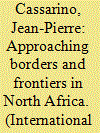

|
|
|
|
|
| Summary/Abstract |
Recent policy developments in the western Mediterranean, especially in North Africa, pose an important puzzle for our understanding of borders and frontiers and the ways in which they are politically addressed. This article sets out to analyse their various implications for patterns of interdependence among states, territoriality, sovereignty, mobility, and last but not least, for domestic politics. By drawing on a vast corpus, the study provides a broader interpretation of such implications which, as argued, cannot be captured with exclusive reference to securitization and processes of demarcation. This endeavour is important to explore how the power dimension in the borderland may interact with other dimensions of the border. Each disciplinary approach discussed in this study, including its heuristic devices, provides a valid explanation of the oft-cited disconnect that scholars have observed in North Africa between the territorially bounded ideal-type of the nation-state and the ways in which it is concretely translated, if not reinterpreted, by borderlanders. An important insight is to venture far beyond disciplinary dogmatism with a view to addressing an array of drivers (be they political, historical, social, economic and geostrategic) that propels bordering practices in North Africa and determines, by the same token, their effects on the ground.
|
|
|
|
|
|
|
|
|
|
|
|
|
|
|
|
| 2 |
ID:
153869
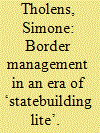

|
|
|
|
|
| Summary/Abstract |
International border management strategies have become the favoured practice to counter global threats, notably terrorism, migration flows and ‘weak states’. This article shows how border security assistance is translated and has political consequences in contexts where sovereignty is contested. It first offers a new conceptualization of contemporary security assistance as a form of ‘statebuilding lite’. These practices are void of comprehensive strategies for broader security governance, and are decentralized, pragmatic and ad hoc. The modus operandi is one whereby each donor develops its own niche, and directly supports specific agencies in the target state. Secondly, the article demonstrates how these tendencies play out in the one of the most important contemporary cases. Assistance to Lebanon since the outbreak of the Syrian civil war is particularly revealing, since Lebanon has received large numbers of Syrian refugees crossing its borders; witnessed rekindling of sectarian violence; and harbours Hezbollah, whose military operations in support of the Assad regime in Damascus draws Lebanon directly into the Syrian conflict. The ensuing situation, where vast amounts of security assistance reach Lebanon's many security agencies in complex ways, can best be described as a security assistance ‘bonanza’. In a micro-study of how the Lebanese Army, police, intelligence and customs agencies have engaged with an EU border management project, the article analyses how discourses of ‘integration’ have encountered the hybrid Lebanese context. It asserts that in the absence of a domestic political strategy, the state reverts back to basic modes of security-driven governance, aided by the readily available security assistance by actors with primarily strategic priorities. Drawing on the case of Lebanon allows us to fundamentally re-think how contemporary security assistance is practiced, and permits conceptualizations of global–local security linkages in a post-national world.
|
|
|
|
|
|
|
|
|
|
|
|
|
|
|
|
| 3 |
ID:
153872
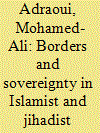

|
|
|
|
|
| Summary/Abstract |
This article explores how Islamists and jihadists have framed issues pertaining to sovereignty, borders, as well as political and religious identity, over the last century. At a time when the territorial delimitations of several Arab countries seem more fickle than ever, it is necessary to address how Islamists and jihadists view the historical and contemporary aspects of borders and sovereignty. The Islamists, on the one hand—whose aim is creating a caliphate—have had to deal with unexpected realities, turning inevitably to some extent of reform of their original revolutionary ambition. The jihadists, on the other hand, while remaining committed to an armed struggle to unify Muslims worldwide, do not advocate for any action other than global insurrection. By focusing on the writings and discourses of major Islamist and jihadist leaders, it thus appears that the study of borders and sovereignty is indispensable to understanding the similarities and differences between the two ideologies. In addition, the study of borders and sovereignty allows for predicting developments in the region that largely pertain to the desire to achieve (jihadists) or amend (modern Islamists) the original revisionist design. It appears that borders, territory and sovereignty prove to be significant constraints for both Islamists and jihadists. Evidently, both Islamists and jihadists have reacted in diverging ways to the political and cultural realities that stand against their founding ideology—with certain Islamist movements having thus nationalized their doctrine, while jihadists still remain eager to achieve their original ambition.
|
|
|
|
|
|
|
|
|
|
|
|
|
|
|
|
| 4 |
ID:
153866


|
|
|
|
|
| Summary/Abstract |
This article aims at a better understanding of the changing nature of borders in warring Syria. Contrary to much media commentary, the Syrian uprising and the subsequent conflict have not been about territorial claims. In 2011, the borders of Syria were de facto pacified and, with the important exception of the border with Israel, were accepted as the legitimate boundaries of the Syrian state. This, however, does not contradict the fact that the unfolding of the Syrian uprising has had deep transformative effects on the borders of the country. Their nature, functions and management have significantly evolved since the uprising first broke out. In 2017, these borders no longer delineate a coherent territory under the control of a unique and somehow cohesive actor: the state. The ongoing territorial and political fragmentation of the country into territories controlled by different armed parties has given rise to multiple forms of control over the Syrian border that reflect the outcome of the armed confrontation. This article analyses the transformations of the borders from the outer boundaries of a state that exercises its sovereignty over its territory and delivers state functions and public goods to its citizens to a spatial envelope in which competing internal legitimacies operate. It also explores the new dynamics of the borders in relation with Syria's neighbours and the international order.
|
|
|
|
|
|
|
|
|
|
|
|
|
|
|
|
| 5 |
ID:
153864
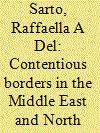

|
|
|
|
|
| Summary/Abstract |
The recent upheavals in the Middle East and North Africa (MENA) have exerted pressure on the regional state system and its borders. Exploring the altered nature and function of borders in a comprehensive and theory-informed manner, together with their domestic, regional and international implications, is long overdue. As a starting point to this endeavour, this article provides the historical context to the problem of contested borders in the MENA region since the formation of the modern state system in the region until today. While problematizing a number of key concepts, the article proposes to analyse the currently contentious nature of many MENA borders by considering the often deeply conflicting configuration of state authority, legitimacy and territoriality over time; the Arab uprisings mark the most recent of a series of critical junctures. Developments at the international, regional and domestic levels are considered while attention is paid to their intersection. The article concludes by raising the question of whether prevailing conceptualisations of the state and its borders are adequate for a real understanding of past and present developments in the region, suggesting that alternative or additional approaches may be helpful.
|
|
|
|
|
|
|
|
|
|
|
|
|
|
|
|
| 6 |
ID:
153868
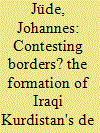

|
|
|
|
|
| Summary/Abstract |
The Kurds are the largest territorially concentrated ethnic group in the world without its own nation state. However, the Iraqi Kurdish population has been striving to establish its own political order for more than two decades and, in northern Iraq, a markedly developed de facto state has emerged. Iraqi Kurdistan has established a considerable degree of autonomy and domestic sovereignty, which is particularly impressive considering the current state of its parent state Iraq. This success is puzzling, when considered alongside the most prominent theory of state formation, which argues that it is war that makes states. War does not explain the Kurdish state-making process. Rather, it has been a major setback for the Iraqi Kurds after 1991. This suggests an alternative theory of state formation, which argues that social coalitions of key elites can account for successful state-building. This article argues that the social coalition of the Kurdistan Democratic Party (KDP) and Patriotic Union of Kurdistan (PUK), which sustained state-building in northern Iraq, emerged and stabilized because of external incentives. Demonstrating unity in front of the international community, and particularly in front of Iraqi Kurdistan's main sponsors, the US and Turkey, has resulted in large flows of revenue for the two parties. The case of Iraqi Kurdistan, therefore, allows for conclusions both on the potential and on the limitations of externally-promoted state-building coalitions. These insights are also relevant for debates on international state-building.
|
|
|
|
|
|
|
|
|
|
|
|
|
|
|
|
| 7 |
ID:
153871


|
|
|
|
|
| Summary/Abstract |
This article looks at smuggling among the Awlad ‘Ali Bedouin in the borderland of Egypt and Libya. Smuggling is understood as a transgressive economic practice that is embedded in the wider social, political and cultural connectivity of the Awlad ‘Ali. This connectivity transgresses state borders, collides with conceptions of state sovereignty, territory and citizenship. In addition, it has a greater historical depth than the respective post-colonial states, and is in many respects more vital than these. During the regimes of Gaddafi and Mubarak the economic productivity and political stability in the borderland was based on the shared sovereignty between politicians and cross border traders of the Awlad ‘Ali and the Egyptian and Libyan state. During and after the Arab spring and particularly in the subsequent civil war in Libya local non state sovereignties that operate across borders have gained significant empowerment and relevance. The article argues that shared sovereignty between state and non-state formations, between centres and peripheries, and between the national and the local level, is a central feature of the real practice of African governance and borderland economies.
|
|
|
|
|
|
|
|
|
|
|
|
|
|
|
|
| 8 |
ID:
153865


|
|
|
|
|
| Summary/Abstract |
To many observers the Middle East state system since the Arab uprisings stands at a critical juncture, displaying contradictory patterns of fragility and durability. The uprisings, which started late in 2010, were revolutionary in their initial impact, but beyond Tunisia, it is the counter-revolutionary movement which has proved more durable. However, the region has witnessed regime changes alongside intense levels of popular mobilization, violence and transnational activism. The results have been highly destabilizing, resulting in challenges, not only to regimes, but to the very sovereignty and territorial integrity of states. This, in turn, has contributed to a shifting regional power balance and repeated episodes of external intervention. Some commentators have argued that the whole regional system, always fragile and contested, is finally undergoing radical transformation; others point to its resilience. This article evaluates the latest wave of instability and its consequences for Middle Eastern states, their sovereignty and regional order, introducing themes and discussions taken up in other articles in this special issue. It argues that despite recent upheavals (and multiple predictions to the contrary), the Middle East system of states and borders will likely remain intact—at least in the medium term. This does not mean that states are necessarily ‘strong’ in a Weberian sense or that sovereignty at different levels is uncontested, but that continuity—state survival and border preservation—is likely to prevail over major change.
|
|
|
|
|
|
|
|
|
|
|
|
|
|
|
|
| 9 |
ID:
153873


|
|
|
|
|
| Summary/Abstract |
States in the Middle East are real states, not yet Weberian and Westphalian, hard rather than strong states in most cases, with few cases of collapse after the Arab Spring. This article develops this idea, by discussing how their aspiring sovereignty over territory with established, if permeable, boundaries is likely to pursue its efforts at consolidation; only the Kurds and the Palestinians militate for a new sovereign entity of their own, with little success after decades of efforts and sympathy. Boundaries are remarkably stable, even often demarcated; challenges arise within the states for control, rather than between states, and at most decentralization in a few states may bring greater self-rule to ethnic groups. The challenge of regional order is not the creation of new boundaries, but the division of the region into a Shi'a Fatal Crescent against a Sunni north and south, both riven by state identity.
|
|
|
|
|
|
|
|
|
|
|
|
|
|
|
|
| 10 |
ID:
153867
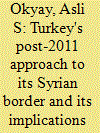

|
|
|
|
|
| Summary/Abstract |
This article examines the implications of the post-2011 conflict in Syria for the relationship between Turkey's shifting border politics and its domestic politics, focusing on the period until mid-2015. The analysis demonstrates that two factors explain the shifts in Turkey's border management modalities in this period. These factors were: first, Turkey's aspiration to enhance its regional influence through a power reconfiguration in post-conflict Syria, in which the Assad regime would be replaced by a predominantly Islamist power elite; second, its concern about its territorial integrity and centralized nation-state model, which it tried to safeguard by impeding the emergence of a Kurdish state, or governance structure with increased autonomous powers and expanded territorial control. Power reconfigurations over the course of the conflict and newly arising threats emanating from the neighbouring civil war also had significant implications for Turkey's border management patterns. Embedded within a highly interconnected region that has also been increasingly structured in ethno-sectarian terms, instrumentally shifting border politics gave rise to a high degree of contestation in the domestic sphere, and contributed to the reinforcement of ethnic and sectarian identity boundaries permeating society and politics in Turkey. The case of Turkey is significant in understanding the overall impact of the post-2011 political transition processes in the Middle East and North Africa (MENA) on border politics, on the degree of interdependence between domestic and international politics, on the links between state borders and identity boundaries, and on state-society relations.
|
|
|
|
|
|
|
|
|
|
|
|
|
|
|
|
|
|
|
|
|